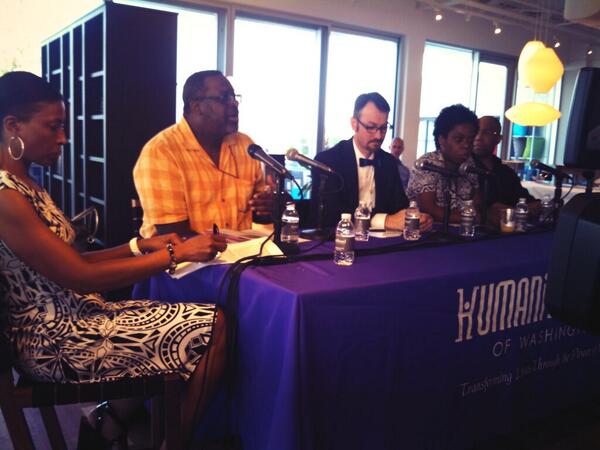Four Separate Days of Food, Fun, and Summer Activities, All FREE to the Public!
The Humanities Council of Washington, DC and Building Bridges Across the River at
THEARC recently announced the kick–off of the Arts & Humanities Festival at St. Elizabeths East to be held on Saturday, July 27, 2013. Made possible through a grant awarded by the Office of the Deputy Mayor of Planning and Economic Development, the festival will be held over four separate days with a culminating event on Saturday, August 24, 2013. The festival is free and open to the public.
 The heart of the festival is located on the grounds of one of the District’s most prized historic sites, St. Elizabeths East, in the 1100 block of Alabama Avenue SE. The East Campus will soon be the home the Gateway Pavilion which will serve as a focal point for the St. Elizabeths East Innovation Hub which will begin to take shape in August 2013. The Pavilion will host concerts, community events, and festivals, as well as corporate meetings, trade shows, and conferences.
The heart of the festival is located on the grounds of one of the District’s most prized historic sites, St. Elizabeths East, in the 1100 block of Alabama Avenue SE. The East Campus will soon be the home the Gateway Pavilion which will serve as a focal point for the St. Elizabeths East Innovation Hub which will begin to take shape in August 2013. The Pavilion will host concerts, community events, and festivals, as well as corporate meetings, trade shows, and conferences.
The Arts & Humanities Festival is the perfect event to celebrate the communities, history and heritage of DC and Ward 8, while embracing the changes to the historic St. Elizabeths East campus, still the home to the first federally operated psychiatric hospital in the United States.
Festival events will kick-off on Saturday, July 27th, followed by a summer celebration weekend on Saturday and Sunday, August 17th and 18th, and a closing event on Saturday, August 24th. Each Festival day will be held from 11:00 a.m. to 4:00 p.m. and feature an exciting scope of activities, live performances, art exhibits, readings and workshops and other exciting activities that will be fun for
the entire family.
Attendees will have the opportunity to whet their appetites with a variety of food. An opening ceremony with Mayor Vincent C. Gray is scheduled for Saturday, July 27th at 1pm.
“The overwhelming support from the community and our partners is paralleled by our ongoing commitment to create platforms to experience the best of Ward 8 and engage its residents to help shape that vision,” said Catherine Buell, Executive Director of St. Elizabeths East.
This kick-off Festival event line-up includes special appearances by emerging urban vocalist IhsAn Bilal, Rapper, AB The Producer, Anthony Anderson and the cast of Anacostia – The Series, and the East of the River Boys and Girls Steelband. Special narratives provided by noted author, Dr. Courtney Davis, Jay Coleman and master storyteller the Honorable Baba-C, Griot. Additional artists will participate in the events held on Saturday, August 17th, Sunday, August 18th and Saturday, August 24th.
For more information on the upcoming Arts & Humanities Festival at St. Elizabeths East, please visit us at www.ahfest.com, follow us on Facebook (www.facebook.com/ahfestdc) and Twitter (@AHFest_DC.)

